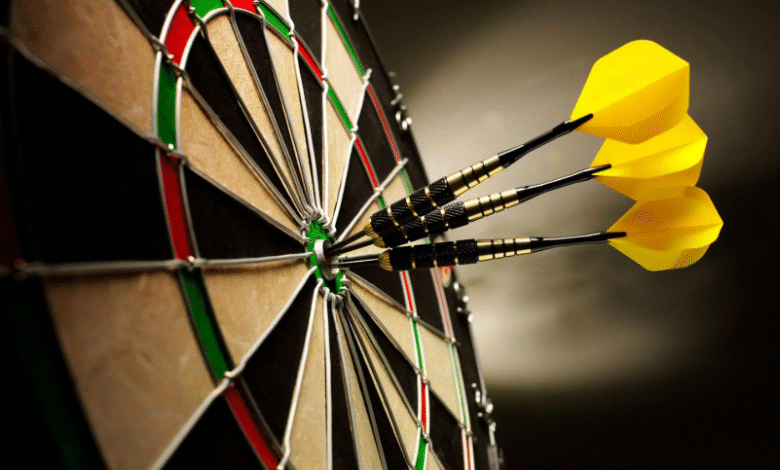Understanding Dart Slang: Ultimate Guide to Darts Terminology

Mastering dart slang is essential for anyone looking to fully enjoy the game of darts and communicate confidently with fellow players. From quirky nicknames for scores to terms describing specific shots and strategies, understanding dart slang brings clarity and fun to every match. In this article, we’ll provide a comprehensive guide to the most common terms and phrases every darts enthusiast should know.
The Importance of Dart Slang
Dart slang is more than just words, it’s a big part of what makes playing darts fun and social. These terms give the game personality, add humor, and help players feel connected. For example, words like “bullseye” (the center of the board), “double” (hitting the outer ring), “treble” (hitting the inner ring), or phrases like “Shanghai” (hitting a single, double, and triple of the same number) let players communicate quickly and clearly during a game.
This keeps the play smooth and avoids confusion. Dart slang creates a shared language that brings players together. Both beginners and seasoned players can join in the conversation, making the game more social and enjoyable. It also connects players to the traditions of the game, adding to the overall experience. Understanding and using dart slang makes games more lively, fun, and memorable while helping players feel part of the darts community.
Common Dart Slang & Terminology
Darts is rich in unique slang and terminology that add flavor to the game, especially in pub settings. Here’s a comprehensive guide to some of the most commonly used terms:
Score-Related Terms
Ton / Ton-80: Scoring 100 points (Ton) or the maximum 180 points (Ton-80) in a single turn of three darts.
Shanghai: Hitting a single, double, and triple of the same number in one turn.
Bust: When a player scores more than needed to finish a leg or fails to end correctly, causing their turn to end and their score to reset.
Checkout / Finish: The exact points required to win a leg, often requiring a double or bullseye to complete.
Specific Shots & Hits
Treble / Triple: Hitting the small inner section of a number, which scores three times the number’s value.
Double: Hitting the outer ring of a number to score double points.
Bull / Bullseye: The center of the dartboard. Hitting the inner bull scores 50 points, and hitting the outer bull scores 25 points.
Robin Hood: A rare and impressive shot where your dart sticks into the back of another dart already on the board.
Madhouse / Canary / Ton-up: Fun, informal nicknames for specific scores, streaks, or achievements, often used casually in pub games.
Game Play & Strategy Terms
Leg: A single game or round of darts.
Set: A collection of legs, often used to determine the winner in a match.
Marker: The player responsible for keeping track of scores.
Pace / Rhythm: The speed and consistency of a player’s throws, important for maintaining focus and accuracy.
High Ton / Low Ton: An Informal way to describe high or moderate scoring rounds.
Fun & Quirky Slang
Monkey: Scoring exactly 111 points in a turn.
Big Fish: A high-value dart thrown under pressure, often turning the game around.
Bed / Bed of Nails: Hitting the same number repeatedly with precision.
Walkaway / Hit the Road: Finishing a game quickly or decisively.
Hitting the Spot / Hitting the Pocket: Landing darts exactly where intended, showing accuracy and skill.
Understanding and using these terms can enhance your enjoyment and participation in darts, whether you’re playing casually or competitively.
See also: The Eternal Isle Awaits: A Gamer’s Journey Through New World
How to Learn and Use Dart Slang
Learning dart slang isn’t just about improving your game, it’s also about becoming part of the fun culture and history behind darts. Here’s how to get started:
Learn the Basics
Start by checking out a dart glossary to understand common and funny dart terms. Websites like Dartscorner’s glossary can help you learn the language of the game.
Use It While Playing
Practice slang terms during games with friends or in leagues. For example, shout “Shanghai!” when you hit a single, double, and triple of the same number, it helps you remember the term.
Learn from Others
Talk to experienced players or watch them in pubs. Hearing real slang like “Annie’s Room” (double 1) or “Bag of Nails” (three darts in the 1s) helps you understand how the terms are used.
Watch the Pros
Professional matches are a great way to hear slang in action. Listen for words like “Nine-Darter” (winning a 501 game in nine darts) or “Big Fish” (a high-scoring checkout under pressure).
Join the Conversation
Use Dart slang when chatting with other players. Compliment someone on a “Champagne Finish” (a stylish win) or a “Walkaway” (a quick game) to sound like a pro and connect with others.
Learning and using Dart slang makes the game more fun and social. It helps you feel part of the dart community while improving your skills and confidence at the board.
Tips for Communicating Like a Pro
Incorporating slang can make your communication more relatable and help build a sense of community, especially in casual settings like a dart league. Here’s how to do it effectively:
Use Slang Wisely: Mix Informal and Clear Language
Slang adds personality, but balance it with clear language so everyone understands you. For example, instead of saying, “Let’s hit the bullseye and rack up some points,” you could say, “Let’s aim for the bullseye to maximize our score.” This keeps your message clear while still sounding friendly.
Listen First: Learn the Terms Before Using Them
Observe how other players talk and pick up the slang they use. For example, if a tricky shot is called a “double trouble,” You can use the word, but don’t use it too much so it sounds natural.
Keep It Fun: Slang Should Include Everyone
Slang should make the game enjoyable, not confuse or intimidate anyone. Use terms that are widely understood in your group. Simple praises like “Nice shot!” keep the mood positive and inclusive.
Combine Slang with Strategy: Communicate Tactically
Slang can also make strategy talk quicker and clearer. For example, calling a scoring combo “the triple-double” is efficient if everyone knows the term. When introducing new slang, explain it to avoid misunderstandings.
Smartly using slang makes dart games more fun, social, and welcoming for everyone.
Conclusion: Mastering Dart Slang
Learning and using dart slang is a great way to enjoy the game more, whether you’re playing casually at a pub or competing in a league. Terms like Ton, Shanghai, Monkey, and Big Fish help players communicate, play smart, and keep the game fun and exciting. Dart slang also connects you to the culture and history of the game, creating a sense of community among players.
Using dart slang while playing and watching others helps improve your skills, builds confidence, and makes the game more fun.
Mastering dart slang makes the game more fun, social, and welcoming. It helps you feel part of the darts community while turning every game into a memorable and enjoyable experience.


